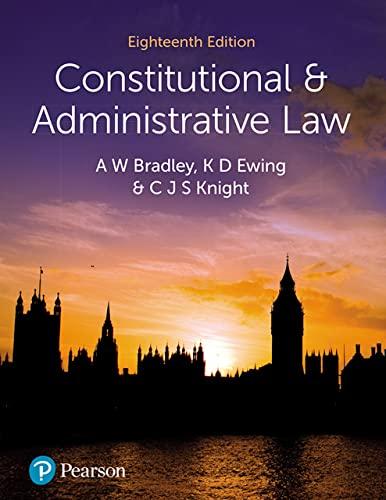Question
can you wr ite a introduction and conclusion for this can you also elaborate the body paragraphs using this information ( scroll down the work
can you wr ite a introduction and conclusion for this can you also elaborate the body paragraphs using this information ( scroll down the work is below)
Constitutional and Administrative Law Summative
Question 1: Critically analyse the following statement: 'The Human Rights Act 1998 gives judges too much power to undermine Parliament'
To what extent do you agree? Refer to both parliamentary sovereignty and the separation of powers in your answer.
Is there tension between the role of parliament and judges under the HRA ?
section 3 HRA - Interpretation of legislation.
(1)So far as it is possible to do so, primary legislation and subordinate legislation must be read and given effect in a way which is compatible with the Convention rights.
(talk about case law) (talk about how the British bill of rights wants to get rid of this section- this may suggest that this section gives judges too much, as parliament may see it as a threat)
Case law:
- Ghaidan v Godin-Mendoza (2004) UKHL 30
- Poplar Housing and Regeneration Community Association Ltd v Donoghue
[2002] QB 48
- RvA(No2)[2001]UKHL25
- Sheldrake v DPP [2005] 1 AC 264
HRA review-provides academic opinions on whether Section 3 gives judges too much power
section 4 HRA- Declaration of Incompatibility , NOT striking down legislation
(Non binding, bill of rights doesn't want to get rid of it but it is trying to limit it, argument it may not give judges power it may give them political power)
Case law:
- A v United Kingdom (the Belmarsh case) [2004] UKHL 56
- R (Chester) v Secretary of State for Justice [2012] UKSC 63
Go over these sections- do these sections under the HRA give judges power
Intro- outline your main arguments Set out whether you think You can argue the following:
HRA give judges too much power,
HRA doesn't give judges too much power
Some parts of the HRA give judges too much power
Paragraphs First sentence-set out your argument for that paragraph What is the section about, and do you think it gives judges too much power Use evidence to support, or goes against your argument (critically analyse) Last sentence - Does not give judges power
------------------------------------------------------------------------------------------------------------------------------------------------------------------------------------------------
The contention that the Human Rights Act (HRA) provides judges with an excessive amount of authority through which they might undermine Parliament, this is a complicated one that calls for an investigation of the separation of powers and the sovereignty of parliament. It is stated in Section 3 of the Human Rights Act (HRA) that legislation ought to be read in a manner that respects convention rights to the fullest degree that is practicable. Some people believe that this provides courts with an excessive amount of discretion and gives them the ability to change the interpretation of laws. Specifically, they cite to decisions such as Ghaidan v. Godin-Mendoza and Poplar Housing and Regeneration Community Association Ltd. v. Donoghue, in which courts construed laws in a manner that some people feel went beyond their jurisdiction and undercut the will of Parliament.
On the other hand, it is essential to take into consideration that Section 3 of the HRA also contains the words "so far as it is possible to do so." It is for this reason that judges are required to interpret the law in a manner that is compatible with convention rights to the maximum degree feasible; yet, they are not granted limitless discretion to implement this interpretation. In the case of R v. A (No 2), the House of Lords came to the conclusion that it was not conceivable to construe the law in a way that would protect an individual who was participating in homosexual intercourse with a child. This case serves as an illustration of the limitation that is placed on the authority of the judiciary.
In addition, the Human Rights Act (HRA) has a provision that permits judges to determine that a piece of legislation is incompatible with convention rights; however, this does not always render the law unconstitutional. Parliament is the body that stands to make the ultimate judgment about how to settle the dispute that exists between convention rights and law. This was proved in the case of A v. United Kingdom, in which the House of Lords decided that the protracted incarceration of foreign terrorist suspects under the Anti-terrorism, Crime and Security Act 2001 infringed their right to liberty. The case was brought about by the United Kingdom. On the other hand, the ultimate decision of how to deal with this matter was left up to Parliament.
When it comes to interpreting legislation and determining whether or not they are compatible with convention rights, the Human Rights Act (HRA) does offer courts a certain amount of discretion; nevertheless, this jurisdiction is certainly not boundless. Judges are obligated to interpret the law in a manner that is compatible with convention rights to the maximum degree feasible; but, they are also constrained by the wording and meaning of the legislation they are interpreting. In order to maintain legislative autonomy while also maintaining the protection of human rights, the provisions of the Human Rights Act (HRA) cre ate a balance between the judicial system and those of Parliament.
Step by Step Solution
There are 3 Steps involved in it
Step: 1

Get Instant Access to Expert-Tailored Solutions
See step-by-step solutions with expert insights and AI powered tools for academic success
Step: 2

Step: 3

Ace Your Homework with AI
Get the answers you need in no time with our AI-driven, step-by-step assistance
Get Started


